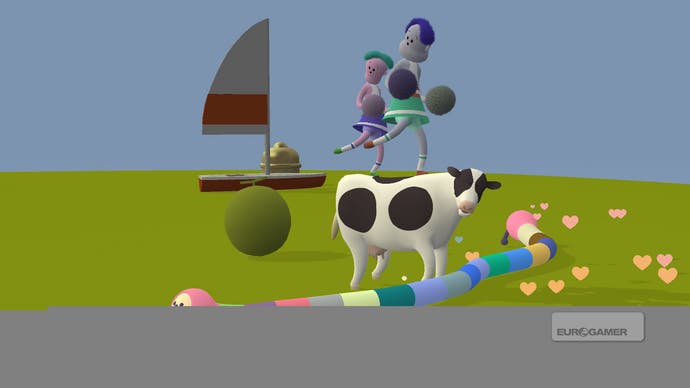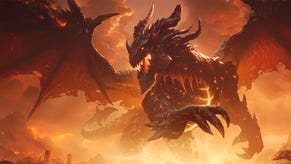Games of 2009: Noby Noby Boy
Stretching a point.
I set my own goals: lasso a cloud down to earth, drape BOY between skyscrapers like a washing line. And the game rewarded me, with trophies, surprises, random happenings, hilarious slapstick and an endless supply of new maps littered with new toys. By the end of the day I was in a completely different frame of mind, and had rediscovered a simple, inquisitive pleasure in interaction that, as a gamer - especially one who does it for a living - it's all too easy to forget in the race to the next achievement.
Noby Noby Boy was the only game I played in 2009 that changed the way I thought.
Naturally, it flopped. No-one got it. A few more people might have got it if the camera hadn't been a hideous exercise in finger-twisting motion-control masochism, but not many. It was too strange, too formless, too childlike. Takahashi's bosses at Namco Bandai complained about the design and asked him to give the player goals or it wouldn't sell, and they were right. "I was told something like 'make it look more like a game', 'make it easier to understand', 'make it more accessible' I think," Takahashi said in our first interview. "I just tried not to care about what I was being told. To be honest, I don't really remember."
Does that make him a hero, or just stupid and irresponsible? Well, probably both, but it makes him a hero to me, and not just because his absurd game gave me an epiphany in a conference room on the outskirts of Paris. Noby Noby Boy rejects all expectations, norms and commercial reason. It doesn't care about what will sell or about patting its players on the head. The only things Takahashi cared about were making the game he wanted himself, and challenging our assumptions about what games are and what they can do. Nobody else could tell him what his game was supposed to be.

Videogaming is a young medium, but it's getting old before its years. In 2009, it's been deeply conservative. There were many excellent releases, but how many of them surprised us, or changed how we felt about games? Where was the Ico, the Deus Ex, the Super Mario 64? With New Super Mario Bros. Wii and Zelda: Spirit Tracks, Nintendo had to turn the clock back a quarter of a century to regain its creative health. Uncharted 2 and Batman: Arkham Asylum are perfect paragons of structure and presentation, of streamlined gratification, of reducing the number of button-presses between us and what we expect. I loved playing these games, of course I did; they gave me a job to do and made me feel good doing it. They were supremely easy to consume.
But you can't consume Noby Noby Boy. You can't complete it. It offers you no validation or sense of accomplishment. This was the game that dared to wonder why I wanted to be told what to do in order to have fun; the game that dared to ask me what I felt like doing myself; the game that dared to ask me what I thought a game was, rather than telling me what it thought I wanted to hear.
You don't have to like Noby Noby Boy. You don't have to understand it. You're allowed to think it's stupid and broken because, well, it kind of is. But you do have to listen to what Keita Takahashi is saying with it, a message he very eloquently delivered to his fellow game creators at GDC.
"If we love videogames, we have to feel more, and observe more, and enjoy more while we create games. There is no completion in games, they are always developing, but despite that we say that there is a certain way that games have to be.
"Perhaps we are hiding behind these rules, and relying on past experiences. Perhaps we have to ignore the players and our companies. Maybe we should just try creating a game that we like."
Check out the Editor's blog to find out more about our Games of 2009.








